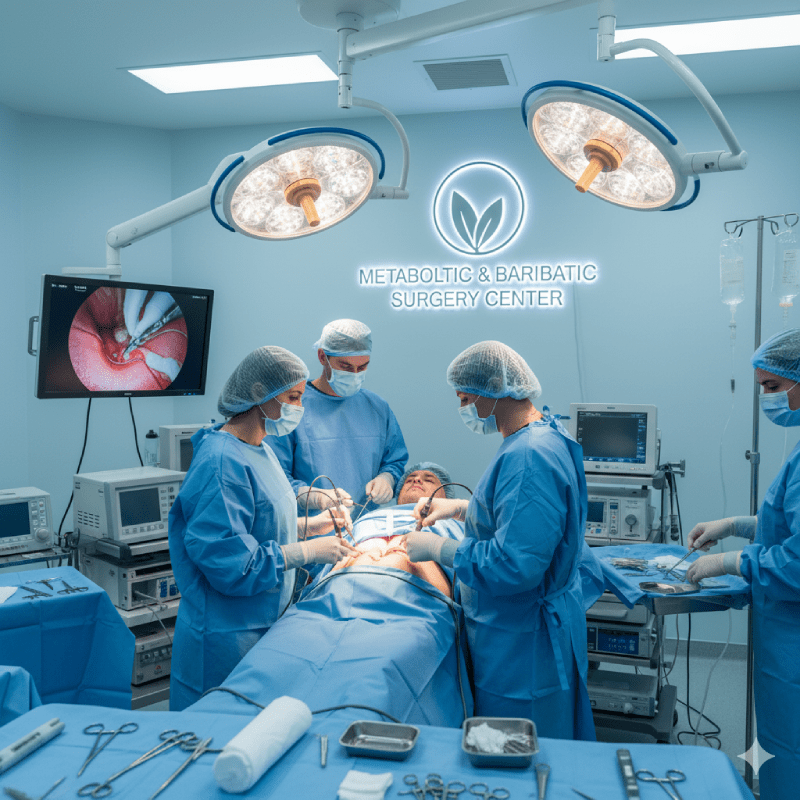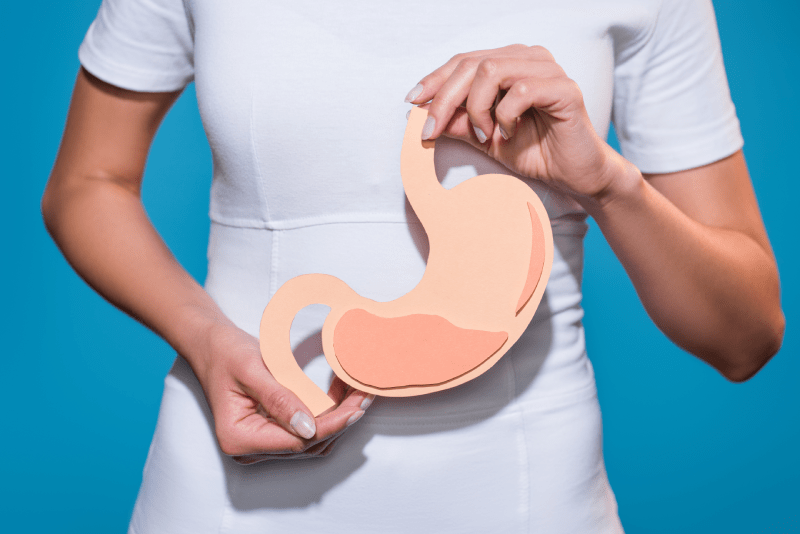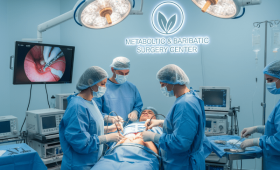What is gastric bypass?
Gastric bypass is a surgical procedure used in the treatment of obesity. In this surgery, a small pouch is created in the upper part of the stomach, and a section of the small intestine is connected to this pouch. This both restricts the amount of food consumed and reduces nutrient absorption.
This dual-mechanism effect results in faster and more permanent weight loss compared to other bariatric surgery methods. The surgery is typically performed laparoscopically (keyhole surgery), which means less pain, a shorter recovery period, and smaller scars. The procedure, combined with the patient’s adaptation to lifestyle changes, provides successful long-term results.
Who can undergo gastric bypass surgery?
There are general criteria for gastric bypass surgery. Typically, individuals with a Body Mass Index (BMI) of 40 or higher, or those with a BMI of 35-40 who have serious health problems like type 2 diabetes, high blood pressure, or sleep apnea caused by obesity, are suitable candidates for this surgery.
Before the operation, patients must undergo a detailed medical and psychological evaluation. This evaluation is critical for determining whether the surgery is suitable for the patient, assessing potential risks, and evaluating the patient’s ability to adapt to the post-surgery process.
How does the surgery process work?
Before the surgery, patients are evaluated by a team consisting of a surgeon, a dietitian, a psychologist, and an anesthetist. These evaluations include blood tests, imaging methods, and other necessary checks.
On the day of the surgery, the patient is admitted to the hospital and undergoes the procedure under general anesthesia. The laparoscopic operation usually takes 2-3 hours. After the surgery, the patient stays in the hospital for a few days and starts a special diet program after being discharged. This program involves a transition from liquid foods to pureed foods, and finally to solid foods.
How much weight is lost with gastric bypass surgery?
Patients generally lose 60-80% of their excess weight within the first 1-2 years. The amount of weight lost depends on the patient’s adherence to the post-surgery diet program and physical activity level. The surgery is just the beginning; the real success is achieved by maintaining lifestyle changes after the operation. Regular follow-up, nutritional counseling, and physical activity guarantee long-term success.
What are the potential risks of the surgery?
As with any surgical procedure, gastric bypass surgery has some risks. These include infection, bleeding, anesthesia-related complications, leakage, nutritional deficiencies, and bowel obstruction. However, these risks are minimized in a well-equipped hospital with an experienced surgical team. Detailed pre-operative evaluation and careful post-operative follow-up are of critical importance in minimizing potential risks.
What should the post-surgery diet be like?
The post-surgery diet involves a slow and gradual transition. For the first few weeks, only liquid foods are consumed. This is followed by a transition to pureed foods and finally to solid foods. Protein intake is of great importance during this process. The dietitian prepares a personalized nutrition plan for the patient, and the patient must adhere to this plan meticulously. Meals should be in small portions and food should be chewed thoroughly.
Why are vitamin and mineral supplements important after surgery?
Gastric bypass surgery reduces nutrient absorption, which can lead to vitamin and mineral deficiencies in patients. For this reason, vitamin and mineral supplements (such as B12, iron, calcium, and vitamin D) must be used for life after the surgery. Regular use of these supplements prevents potential deficiencies and protects the patient’s overall health. Vitamin and mineral levels should be monitored with regular blood tests.
Can gastric bypass be reversed?
Gastric bypass is theoretically a reversible surgery, but the procedure is quite difficult and complex. Reversal surgery is usually performed due to serious complications or nutritional problems. Therefore, it is important for patients to consider this operation as a permanent solution when making the decision to undergo surgery. All risks and expectations should be discussed in detail with the patient before the surgery.

When should exercise be started after surgery?
Only light walking is recommended in the first few weeks after surgery. With the doctor’s approval, more intense exercises can be started in about 4-6 weeks. Exercise accelerates weight loss, preserves muscle mass, and improves overall health. It should become an important part of life after the surgery. Regular exercise also plays a big role in the weight maintenance process.
What is dumping syndrome after surgery?
Dumping syndrome is a condition that occurs when sugary and fatty foods pass too quickly into the small intestine. This can lead to symptoms such as nausea, vomiting, diarrhea, abdominal cramps, and fatigue. To prevent this syndrome, patients should avoid sugary and fatty foods, eat slowly, and not consume liquids during meals. Dumping syndrome serves as a warning for patients to regulate their eating habits.
Who is not a suitable candidate for gastric bypass surgery?
Individuals with severe alcohol or drug addiction, those with serious psychological disorders, patients who are not expected to comply with the requirements of the surgery, and those with chronic diseases that make the surgery risky are not suitable candidates for gastric bypass surgery. These conditions can reduce the success rate of the surgery and lead to serious health problems.
Is hair loss normal after surgery?
Yes, temporary hair loss can occur after surgery due to stress from rapid weight loss and nutrient deficiencies (especially protein and zinc). This condition usually starts a few months after the surgery and improves as the nutritional routine is established. Adequate protein intake and regular use of supplements recommended by the doctor can help minimize this problem.
Can type 2 diabetes be cured with gastric bypass?
Gastric bypass is highly effective in the treatment of type 2 diabetes. Thanks to weight loss and hormonal changes after the surgery, type 2 diabetes is controlled or completely cured in the vast majority of patients. This is one of the most important benefits of the surgery and significantly improves the quality of life for patients.
Can pregnancy be planned after surgery?
Yes, but it is recommended to wait at least 12-18 months after the surgery. During this time, the body adapts to major weight loss and nutritional deficiencies are brought under control. This waiting period is important for the health of both the mother and the baby. Before planning a pregnancy, a discussion should be held with the doctor and dietitian, and vitamin and mineral supplements should be continued.
Is sexual life affected after surgery?
Weight loss after surgery can improve sexual function disorders caused by obesity. Increased self-confidence and an improvement in overall health can positively affect the quality of sexual life. However, due to hormonal and psychological changes, some patients may experience temporary adaptation problems.
How can sagging skin be prevented or treated after surgery?
Sagging skin can occur due to rapid weight loss. To minimize this, it is important to exercise regularly before and after the surgery and to drink plenty of water. If sagging becomes aesthetically bothersome, these problems can be corrected with plastic surgery operations after weight loss has stabilized (usually 1.5-2 years later).
Is alcohol consumption allowed after gastric bypass surgery?
After surgery, alcohol absorption increases and it becomes easier to get drunk. Also, alcohol can be harmful to the surgical stomach and can lead to weight gain. Therefore, alcohol consumption is not recommended after surgery and should be completely avoided if possible. Alcohol can negatively affect the long-term success of the surgery.
Why is psychological support important after surgery?
Obesity is not only a physical problem but also a psychological one. Rapid weight loss and a changing body image after surgery can affect the patient’s psychology. It is important to receive psychological support to avoid problems such as depression, anxiety, and eating disorders.
How long does the post-surgery follow-up process last?
The post-surgery follow-up process is more frequent during the first year (usually every 3 months). After that, this follow-up interval can be extended to once a year or every two years. Follow-up processes ensure that the patient is taking their supplements regularly, meeting their weight loss goals, and allow for early diagnosis of potential complications.
What kind of foods are forbidden after gastric bypass surgery?
After surgery, it is necessary to avoid high-calorie, low-nutrient foods such as sugary drinks, carbonated beverages, chips, junk food, sweets, and fast food. These types of foods can cause dumping syndrome and lead to weight gain. It is important to adhere to a healthy and balanced diet plan.
Is it possible to regain weight after surgery?
Yes, it is possible to regain weight if the post-surgery diet and physical activity are not maintained. The excessive consumption of sugary and fatty foods, in particular, can reduce the effect of the surgery. The surgery is a tool; the main responsibility is for the patient to continue with lifestyle changes.
How long does the recovery process take?
The full recovery process after surgery varies from person to person. Most patients can return to their normal daily activities a few days after the surgery. They can return to work in about 2-4 weeks. Heavy lifting and intense sports should be avoided.
How much does gastric bypass surgery cost?
The cost of the surgery varies depending on the hospital, the experience of the surgeon, and the country where the surgery is performed. Different pricing is applied in private and state hospitals in Turkey. It is also important whether the surgery is covered by health insurance.
How can stretch marks be removed after surgery?
Stretch marks that occur due to rapid weight loss are usually permanent, but their appearance can be improved with moisturizing creams and special care products. Laser treatments and aesthetic surgery methods can also be used in the treatment of stretch marks.
Is nausea and vomiting normal after gastric bypass surgery?
Nausea and vomiting may be common in the first few weeks after the surgery. This situation usually occurs due to eating too quickly, consuming large portions, or not chewing food enough. Regulating eating habits solves this problem.

How can gas and bloating be relieved after surgery?
Gas and bloating complaints can be experienced frequently after surgery. This can be controlled by eating slowly, avoiding gassy foods, and walking regularly. Herbal teas such as peppermint tea and fennel tea can also alleviate these complaints.
Is there pain after gastric bypass surgery?
Post-operative pain can be easily controlled with painkillers. It is usually most severe in the first few days and decreases over time. The laparoscopic method causes less pain than open surgery.
How can protein absorption difficulty be overcome after surgery?
Protein absorption can be reduced after surgery. For this reason, it is important to consume high-protein foods and use protein supplements. The dietitian prepares a special protein plan according to the patient’s needs.
How can appetite be controlled after surgery?
Appetite decreases after surgery thanks to the reduction in stomach size and hormonal changes. However, emotional eating habits may continue. Psychological support can help with appetite control.
How does life change after gastric bypass surgery?
Gastric bypass surgery significantly improves patients’ quality of life. Health problems related to obesity improve, self-confidence increases, and social life becomes more active. However, this change is only possible with the patient’s adaptation to a new lifestyle.
dolcontin gastric bypass
Dolcontin is a kind of pain reliever given to patients after gastric bypass surgery. The morphine in it relieves the pain of the patients, facilitates digestion and provides easier breathing. Therefore, patients should get used to the new digestive system by using dolcontin for a while. It should be known that this is only a precaution and should be used for the healing process.
At the same time, since it is an addictive drug, it must be used under the supervision of a doctor and you should stop the drug within the time the doctor tells you to stop the drug. Otherwise, you will inevitably experience stomach aches and digestive problems that never go away. This is another important point in getting gastric bypass surgery Norway. Getting treatment from experienced surgeons is important both for controlling your drug use and for a more successful operation.
gastric bypass life after
It would be very correct to think about your life after gastric bypass surgery. Because gastric bypass surgery will make a radical change in your diet. After gastric bypass surgery, patients will gradually avoid fluid and will be fed with very few portions throughout their lives. While the smaller portions will not make a big difference as their stomach will also shrink, the fact that they will eat a healthy and often sugar-free diet is worrying for most patients. If we look at today’s eating habits, even if they are unhealthy, chips, waffles, chocolates and hamburgers should no longer be an escape.
In addition to these, patients will need vitamin supplements after the surgery, as they will remove the nutrients from their bodies without digesting them. This means that they will have to live with vitamin and mineral supplements for the rest of their lives. However, you should be sure that living depending on vitamin and mineral supplements will be a better choice than a sedentary and unhealthy life that develops due to excess weight.
feeling after gastric bypass
Immediately after gastric bypass surgery, you will probably wake up in the Norway bariatric clinic. In the first moments you wake up, you may have difficulty opening your eyes and you may have difficulty moving. Therefore, you should continue to rest. You should also know that you should not eat anything for 24 hours after waking up. Since you will be hungry for 24 hours before the operation, you may feel a great hunger when you wake up. It is also normal to feel some pain due to the stitches in your stomach. It will only make you feel as if they are holding you tight.
In the days after the surgery, your pain will continue. You should use the medicines given by your doctor. However, you should follow the schedule given by your dietitian and drink plenty of fluids. When you first start eating, you may experience nausea and some stomach pain. Therefore, instead of taking large bites in one go, you should start eating in much smaller portions. Your dietitian will give all these tips. If you follow the advice of doctors after gastric bypass surgery, you will easily get through the recovery process.
Gastric Bypass Norway Price
Gastric bypass is an extremely serious and radical operation. Therefore, patients should be aware that Norway Gastric bypass surgery costs are extremely high. Although gastric bypass surgery prices are quite high in many countries, this price is equally high in Norway. Therefore, patients who do not want to pay the Norway gastric bypass cost prefer to be treated in different ways.
This will be very advantageous. Because the Norway gastric bypass prices are much higher than in many countries and the insurance will not reimburse it. Therefore, patients can save a lot by receiving treatment in different countries. Because Norway Gastric Bypass prices start from 7,500 € on average. You should also know that these prices do not include hospitalization and testing.
Ways to Get Gastric Bypass at Affordable Prices in Norway
You should know that you can’t get gastric bypass cheaply in Norway. As mentioned above, even the minimum price you will pay is almost 11.000€, isn’t it extremely high? However, by choosing different countries instead of having gastric bypass surgery in Norway, you can both get free dietitian support and get better prices for all accommodation, tests and treatment. How Does? As gastric bypass surgery in Turkey!
Turkey is an important country in the field of health tourism. For this reason, it is often preferred for gastric bypass surgeries. Considering the cheap cost of living and the high exchange rate, people can get gastric bypass in Turkey at the best prices. You can also take advantage of this advantage and get gastric bypass in Turkey.
Gastric Bypass Price in Turkey
You should know that gastric bypass treatments are available in many countries for tens of thousands of euros. The exchange rate in Turkey is so high that almost free treatments are possible. With a small calculation, considering that the Norway gastric bypass cost is €9,500, it is possible to receive Gastric Bypass treatment in Turkey for less than half of it!
High exchange rate and low cost of living in Turkey enable patients to receive gastric bypass treatment in Turkey at very affordable prices. Although treatment prices vary throughout the country, as Cure Holiday, we pay 2.250 € for Gastric Bypass. At the same time, if you want your accommodation and all other expenses to be covered;
Our Package Prices as Cure Holiday; 2.650€
Our Services Included in Package Prices;
- 3 days hospital stay
- 6-Day Accommodation in a 5-star hotel
- Airport transfers
- PCR test
- nursing service
- Medication



